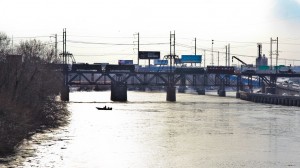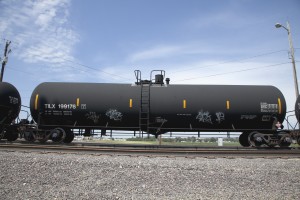Governor Wolf hires rail expert to evaluate oil train risks
-
Susan Phillips

Kimberly Paynter/WHYY
Seven cars of a 101-car train traveling from Chicago to a refinery in South Philadelphia slid off the tracks on the Schuylkill Arsenal Bridge in January, 2014.
Governor Tom Wolf has hired a rail expert to examine Pennsylvania’s railway infrastructure and report back on safety issues. The appointment is the latest move by Gov. Wolf to address increasing concerns about crude-by-rail transport. An oil train derailment and explosion in West Virginia earlier this year was touched off by a broken track, and led to a spill from defects in the tank cars, according to federal regulators.
Pennsylvania has experienced four train derailments since January 2014. Two of those derailments happened in heavily populated Philadelphia, but none resulted in a fire.
The Wolf Administration announced Tuesday that Allan M. Zarembski, a professor at the University of Delaware, will spend three months evaluating risks associated with transporting crude oil across the state’s freight rail lines. Zarembski will also make safety recommendations to the Wolf Administration.
Nationwide, crude by rail shipments have risen about 4000 percent in the past several years because of the shale oil boom in North Dakota, and the lack of pipeline infrastructure to carry all that crude to refineries on the East Coast.
Gov. Wolf has made oil train safety a priority during the first 100 days of his administration.
In February, Wolf sent a letter to President Obama urging action on oil train safety. Wolf has also spoken to executives at the railway companies Norfolk Southern, and CSX, urging them to boost safety measures, according to the governor’s spokesman Jeff Sheridan. Wolf says he’s working to prevent a disaster.

AP Photo/Nati Harnik
A DOT-111 rail tanker travels through Council Bluffs, Iowa. The expanded use of these older freight-rail cars by the oil industry has prompted calls for safety upgrades. Philadelphia is one of busiest crude-by-rail shipment areas in the U.S.
“Dr. Zarembski is an internationally recognized rail expert and he has extensive experience with rail safety and risk analysis,” Wolf said in a statement. “Pennsylvania sees some of the largest volume of Bakken crude oil transportation by rail in the United States and the potential for disaster is too great to ignore. I will continue to take steps to ensure the safety of Pennsylvania’s citizens.”
According to Zarembski’s biography, he is an expert in railway track and structures, vehicle-track dynamics, failure and failure analysis, safety, railway operations, and maintenance. He is currently research professor and director of the railroad engineering and safety program at the University of Delaware’s Department of Civil and Environmental Engineering.
Each week, about 60 to 70 trains carrying crude oil from North Dakota’s Bakken region travel through Pennsylvania to East Coast refineries like Philadelphia Energy Solutions, the former Sunoco plant in South Philadelphia. The companies are only required to report the trains carrying more than 1,000,000 gallons of crude.
Sheridan says the Wolf Administration is also reviewing the “frequency and procedures associated with rail infrastructure inspections by federal and state inspectors.”
Pennsylvania has one person certified in HAZMAT dedicated to inspecting railways. The bulk of regulatory oversight of railroads is under the authority of federal agencies.
Through the Pennsylvania Emergency Management Agency, the state has prioritized oil train incidents when handing out training grants to local first responders.
Eight employees from PEMA and the State Fire Academy, as well as 33 first responders from 11 Pennsylvania counties have been sent to a specialized training program in Pueblo, Co. run by Norfolk Southern. The state is also planning to purchase one or more mobile high-volume, large caliber water pumps for HAZMAT incidents, according to PEMA spokesman Cory Angell.
















